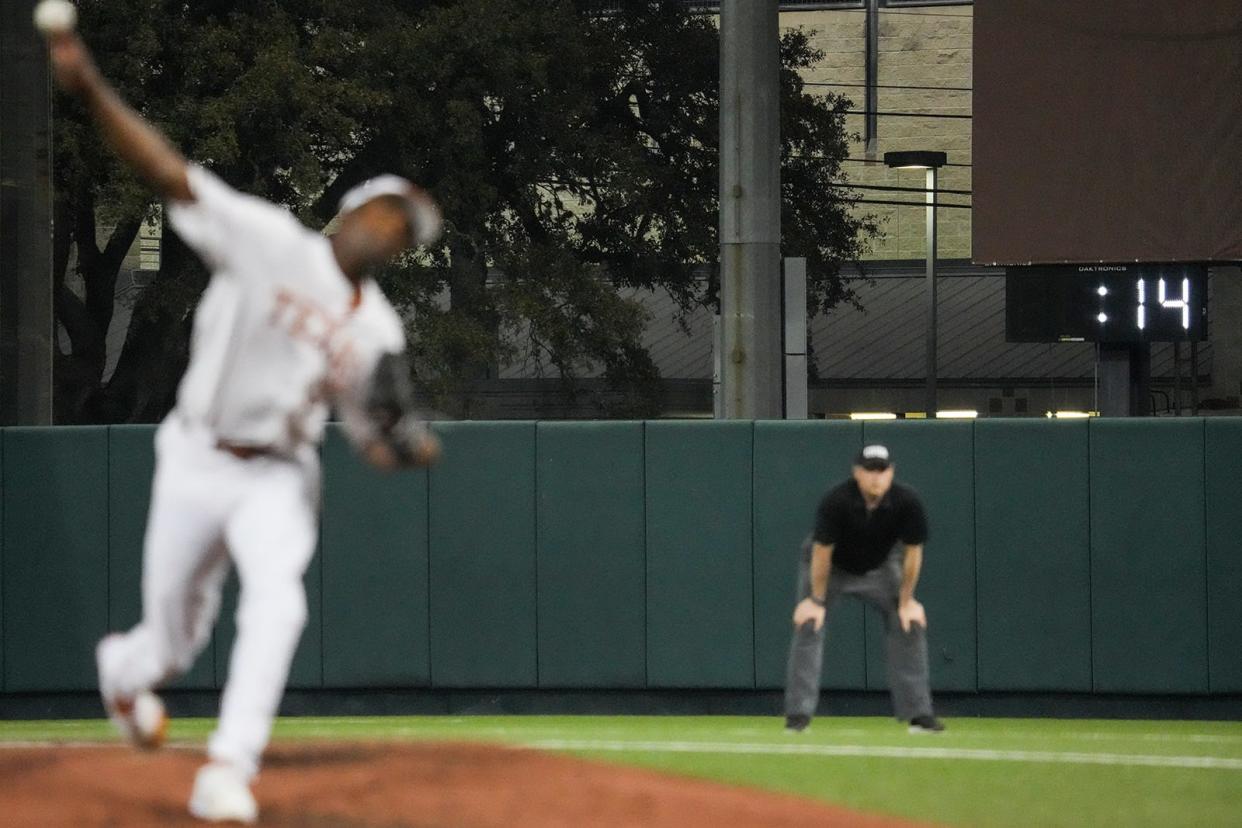Hurry up! Texas, just like everybody else, is struggling with baseball's new clock rule

- Oops!Something went wrong.Please try again later.
While facing No. 1 LSU on Tuesday, Texas pitcher Lebarron Johnson Jr., threw five innings of shutout baseball.
The record will show that he threw a career-high 92 pitches in a game that Texas eventually lost 3-0. LSU batters, however, saw only 91 offerings from him.
In the second inning, Johnson was called for a violation of the NCAA's 20-second action clock. LSU batter Jared Jones was awarded a ball in what had been a 2-2 count.
"I didn't think I would ever get caught, but I guess it was tonight I got caught," Johnson said.
Had this been last year, Johnson would have gotten off with a warning. But as players, coaches and fans are finding out, things are different this season.
Last August, the NCAA announced that it was modifying the rules for its already implemented 20-second action clock. If there's a runner on base, pitchers now may step off the rubber or fake a pickoff throw only once during each at-bat to reset the clock. Warnings are no longer to be given for violations of the 20-second clock, which affords a pitcher that much time to begin his windup.
New NCAA rule works both ways for pitchers, hitters
Batters also can violate the action clock in a variety of ways.
If a pitcher violates the clock, a ball is awarded to the batter. If the batter is the guilty party, that's a free strike.
Get in the box or get on out pic.twitter.com/FR1qkJr4Ey
— Arkansas Baseball (@RazorbackBSB) February 18, 2023
In UT's season opener against Arkansas, outfielder Dylan Campbell violated the action clock. Since he already had two strikes in his count, he was ruled out. The sixth inning was suddenly over.
After the loss, Texas coach David Pierce reportedly referred to the revamped rule as "a joke." When asked about that situation later, Pierce said Campbell was looking down in the batter's box and that inattentiveness was deemed to be a violation.
"My (comeback) on that is, well, throw the pitch. Well, then it becomes a safety issue," said Pierce, who has had less of an issue with enforcement than with the rule itself. He noted that umpires are evaluated by their enforcement of the rulebook and said, "They're trying to go to Omaha, basically trying to do the same thing we're trying to do."
"They have so much work to do in the whole course of looking at the clock, restarting the clock at the right time and then trying to figure out is the kid ready to hit," Pierce said. "It's tough on the umpires. I can't say that they're really advocates of it either."
Oh my god… they just ended the game on a hitters clock expiration. Gtfoh 🙄 pic.twitter.com/8feDtvFCht
— 11Point7: The College Baseball Podcast 🎙 (@11point7) February 24, 2023
Not going to be easy getting use to these new rules in College or @MLB 😂 hang in there Boyz! pic.twitter.com/nXa8o2wSqP
— Ben McDonald (@realbenmcdonald) February 18, 2023
Negative reaction: It's not just a Texas thing
The Longhorns aren't the only ones who have had to adjust to the new rules. In the LSU game, UT reliever DJ Burke earned a strikeout when Jones violated the clock while batting with a 2-2 count. On Feb. 24, a 7-3 win for LSU ended on a violation by a Kansas State batter. A viral video surfaced last month showing Tennessee's Christian Moore repeatedly failing to get a timeout awarded during an at-bat against Arizona.
"Total joke … only college baseball changes the rules EVERY year," Texas A&M coach Jim Schlossnagle tweeted. "Not fair for anyone involved … including umpires, players & coaches … any organization with any sort of FEEL would adjust now!!!!"
"It’s ruining the game," Arkansas coach Dave Van Horn said last month. "In my opinion, with runners on, don't have it."
But not every coach has railed against the clock. Vanderbilt's Tim Corbin told the Tennessean last month that "I just think that if we get a year under our belt, I think everyone's gonna look back and say, OK, you know, it's fine."
With balls and strikes on the line, players make changes
Corbin is probably right. And the Longhorns are adjusting. Outfielder Porter Brown had previously prepped for pitches with a lengthy plate routine, but he has cut out his practice swing. He never completely leaves the batter's box between pitches anymore.
"It's definitely different going up there and knowing that you're kind of getting a little rushed, but if you just get in the mindset and you just get in the box, the pitcher has to throw to you. He can't throw it until you get in the box," Texas' Garret Guillemette said. "I think we're going to be perfectly fine."
As a catcher, Guillemette said the new rules haven't forced him to adjust that much defensively. He says assistant coach Woody Williams doesn't waste much time relaying what pitch he wants thrown. It is paramount for him to quickly throw down the sign so his pitcher "has enough time to make the pitch and visualize what he wants to do."
"I can see Garret look at the clock. That's when I know, OK, I need to really get going," Johnson said. "When he looks at the clock, that's when I know."
This weekend's series
Texas (3-5) at Cal State Fullerton (2-4), Friday-Sunday, ESPN+, 104.9
Probable pitching matchups: Friday (8 p.m.) — UT LHP Lucas Gordon (0-0, 0.84) vs. LHP Tyler Stultz (1-1, 5.00); Saturday (7 p.m.) — UT RHP Zane Morehouse (1-0, 4.00) vs. RHP Trevor Hinkel (0-1, 9.35); Sunday — UT RHP Travis Sthele (0-2, 3.12) vs. TBA
This article originally appeared on Austin American-Statesman: Texas baseball is adjusting to new NCAA 20-second action clock rule

